Sunday Epistles & Gospels
Fifth Sunday of Luke
A Glimpse Into Heaven & Hell
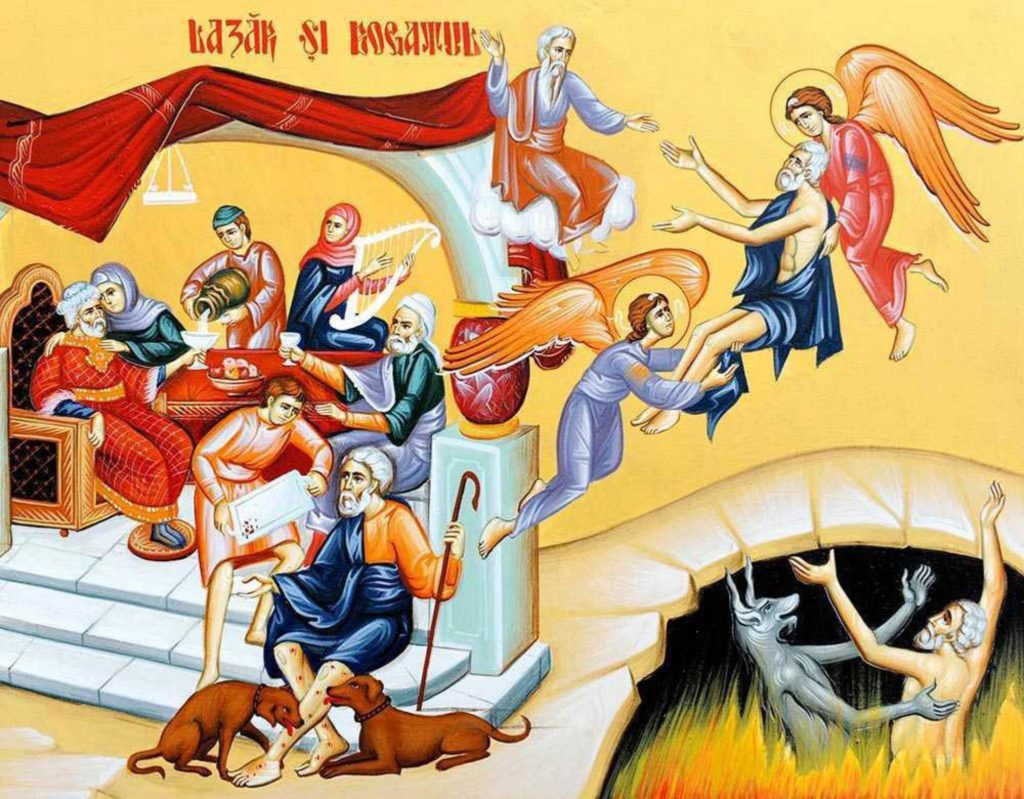
Gospel for the Fifth Sunday of Luke
Luke 16:19-31
The Lord said, “There was a rich man, who was clothed in purple and fine linen and who feasted sumptuously every day. And at his gate lay a poor man named Lazaros, full of sores, who desired to be fed with what fell from the rich man’s table; moreover the dogs came and licked his sores.
The poor man died and was carried by the angels to Abraham’s bosom. The rich man also died and was buried; and in Hades, being in torment, he lifted up his eyes, and saw Abraham far off and Lazaros in his bosom. And he called out, ‘Father Abraham, have mercy upon me, and send Lazaros to dip the end of his finger in water and cool my tongue; for I am in anguish in this flame.’
But Abraham said, ‘Son, remember that you in your lifetime received your good things, and Lazaros in like manner evil things; but now he is comforted here, and you are in anguish. And besides all this, between us and you a great chasm has been fixed, in order that those who would pass from here to you may not be able, and none may cross from there to us.’
And he said, ‘Then I beg you, father, to send him to my father’s house, for I have five brothers, so that he may warn them, lest they also come into this place of torment.’
But Abraham said, ‘They have Moses, and the prophets; let them hear them.’
And he said, ‘No, father Abraham; but if some one goes to them from the dead, they will repent.’
He said to them, ‘If they do not hear Moses and the prophets, neither will they be convinced if some one should rise from the dead.'”
Christians naturally wonder what heaven will be like. Many ascribe secular characteristics to heaven (i.e. we’ll be playing golf, food won’t have any calories, etc). We also wonder what hell will be like. Does it even exist? Some wonder if this life on earth is hell for everyone and then we all get into heaven. The Bible has many references to heaven and hell and judgment (what happens after we die), but perhaps the best teaching on heaven and hell comes from this morning’s Gospel lesson.
First, we meet two men in the Gospel lesson, a rich man, and a poor man named Lazarus. The rich man is well dressed and feasts sumptuously every day. Lazarus is both poor and sick. He sits at the gate of the rich man’s house, hoping to eat the crumbs that the rich man is not going to eat anyway. Lazarus never becomes bitter towards the rich man. He never steals from him. He never complains about his lot in life. He lives a life of patience and suffering.
The rich man, on the other hand, has ample opportunities to help Lazarus. He doesn’t even have to give Lazarus of his abundance. Even the left over scraps will suffice. He lives a life of indifference towards Lazarus.
In time both men die. The rich man ends up in hell, not because of his riches, but because of his indifference, and his failure to love his neighbor Lazarus. Lazarus ends up in the bosom of Abraham, not because he was poor but because he was humble and patient with the life he had.
And here is where our pictures of heaven and hell begin to take shape.
We are told in the Gospel that the Lazarus was carried by the angels to the bosom of Abraham. That image portrays glory (the angels) and comfort (the bosom of Abraham)—imagine a little child being embraced by his mother, comforted in time of sickness or when he is scared.
The rich man is in hell. He is described as being in torment. It’s hot where he is. He begs Abraham to send Lazarus to dip his finger in water and put it to the tongue of the rich man. So we know that hell is a place of torment.
Abraham said that this is impossible because there is a chasm between heaven and hell. Those in heaven cannot fall out of heaven and go to hell. Those who are in hell cannot come out of hell and rise to heaven. Being in heaven or hell is permanent.
All of a sudden, the rich man who spent his life indifferent his neighbor, all of a sudden becomes concerned with the welfare of his five brothers. He doesn’t want them to end up in hell. He all of a sudden finds the virtue of love and compassion which he didn’t have in life. But it is too late. In hell, it will be too late for Christian virtue and faith to save the one consigned there.
And finally, those in hell will be aware of those who are in heaven. They will see heaven, and know that they cannot be there. Imagine a hot summer day at your church community. You are sitting outside on hot asphalt. There is nothing to drink, no sunscreen and no relief. There are a hundred people sitting out there with you. You are all suffering. But at least you are comforted by the fact that you are suffering together. However, imagine that in the church hall, a hundred people are inside, in cool air conditioning, eating, drinking, dancing. You can see them. But you can’t be with them. You have the knowledge not only of your suffering but of the joy that others are experience that you can never share in. This is hell. An awareness of God, with the inability to be with God.
Where heaven is, and what exactly the “bosom of Abraham” will look and feel like are unknown. What is known that is that heaven will be a place of joy, hell will be a place of torment, both places will be permanent for those assigned to them, and our assignment to one or the other will be based on love, or indifference. And once we are assigned, that assignment will be permanent. So what to do today? Look for the “Lazaruses” of the world and help them. And if you are “Lazarus,” be patient in suffering and don’t lose faith.
First Resurrectional Praise
Translated by Fr. Seraphim Dedes
Every breath and all creation glorifies You, O Lord. For by means of the Cross You rendered death powerless, so that You might show the peoples Your Resurrection from the dead, as the only One who loves humanity.
Be patient in your circumstances, and look for opportunities to love today!
+Fr. Stavros
This article was originally published on November 5, 2017
More articles from Fr. Stavros' series on
SUNDAY EPISTLES & GOSPELS
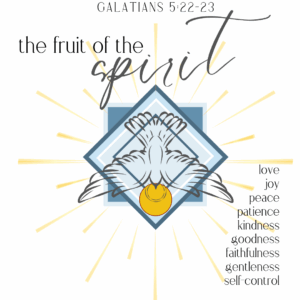

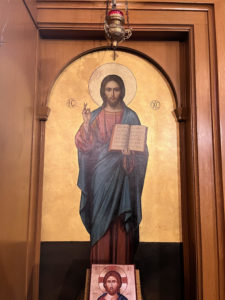
Sunday Epistles and Gospels | Over or Under?


Independence Day | Let Freedom Ring

Fruit of the Spirit | Love Doesn’t Just Happen

Posted by the Orthodox Christian Network (OCN).
With Roger Hunt providing today’s Daily Reading: Listen Now.
These readings are under copyright and is used by permission. All rights reserved. These works may not be further reproduced, in print or on other websites or in any other form, without the prior written authorization of the copyright holder: Reading © Holy Transfiguration Monastery – Brookline, MA, Apolytikion of Abbot Marcellus © Narthex Press, Kontakion of Abbot Marcellus © Holy Transfiguration Monastery – Brookline, MA.
The Revised Standard Version of the Bible is copyrighted 1946, 1952, 1971, and 1973 by the Division of Christian Education of the National Council of the Churches of Christ in the U.S.A. and used by permission. From the Online Chapel of the Greek Orthodox Archdiocese of America.
Orthodox Christian Network (OCN) is a 501(c)3 and an official agency of the Assembly of Canonical Bishops of the United States of America . It is a recognized leader in the Orthodox Media field and has sustained consistent growth over twenty-two years. We have worked to create a community for both believers and non believers alike by sharing the timeless faith of Orthodoxy with the contemporary world through modern media. We are on a mission to inspire Orthodox Christians Worldwide. We have reached 5.7 Million People in One Week and we want to reach millions more! Signup to receive our newsletter email: info@myocn.net.
Do you find it hard to keep focused on Christ when you’re on the go? OCN makes it easy! You can be inspired daily by the OCN programming from where ever you are by plugging into our Listen, Read, Watch , Worship. To learn more about emerging Orthodox leaders in our Community check out OCN 30 Under 30 Initiative. It is an opportunity to show support for and invest in this next generation of trailblazers.
Much like public radio, the Orthodox Christian Network relies on the support of our listeners, readers, volunteers, and fans. If you are interested in supporting our work, you can send your sustaining gift by direct mail, over the phone, or on our website. Your gift will ensure the continued growth of this encouraging Orthodox Community by providing faith-building, free, high-quality programming. Give today to help you and your Orthodox community stay connected no matter the location.
Click here to download the Spark OCN and Orthodox Prayer Book.
Podcast: Play in new window | Download
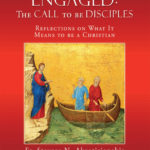

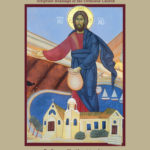
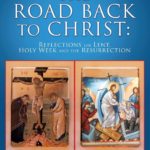
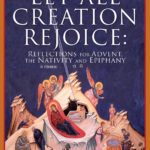



0 Comments